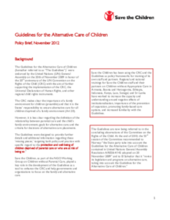This policy brief by Save the Children introduces the background, goals, and guiding principles of the Guidelines for the Alternative Care of Children while also explaining why family-based care is a preferred care arrangement over institutions. Furthermore, it suggests policy and practice recommendations to further protect children without appropriate care and strengthen families and communities. Save the Children has been involved at the international level in the development of the Guidelines and at the country level in efforts to ensure use of the Guidelines as a framework for reform.
The Guidelines for the Alternative Care of Children were endorsed by the UN General Assembly on the 20th of November 2009 in honor of the 20th anniversary of the UN Convention on the Rights of the Child (CRC) with the aim of further supporting the implementation of the Convention. The CRC makes clear the importance of family environment for children and that it is the State’s responsibility to ensure alternative care for all children deprived of family environment. The Guidelines were designed to provide further guidance regarding the definition of the relationship between parental care and the child’s family environment, goals for alternative care, and the criteria for decisions of alternative care placements. The Guidelines target both policy and practice with specific regard to the protection and wellbeing of children deprived of parental care or who are at risk of being so. The brief outlines the key guiding principles set forth in the Guidelines in relation to decisions and interventions regarding alternative care, including necessity, appropriateness, the best interest of the child and the right to participate and preference for family-based care.
The brief also discusses the research evidence on the negative effects of institutionalization on children’s health, development, and wellbeing and that institutional care has been also widely shown to be far more expensive compared to family-based care. It highlights the Guidelines’ direction that institutional care should be avoided whenever possible, regulated, monitored, and transformed into family-based care alternatives.
Save the Children strongly supports the Guidelines and urges countries to use them as a reference and a tool for child protection and welfare legislation and policy reform. It calls on all stakeholders to commit to and invest in families for the wellbeing of children, working to prevent separation of children from their families, supporting families to care for their children, and seeking alternative family-based care for children for whom alternative care is absolutely necessary. The brief provides a number of examples on the use of the Guidelines at the regional levels and country levels, to support reforms of the alternative care systems and strengthen child protection, including in Ethiopia, Liberia, Egypt, Jordan, Georgia, Indonesia, Haiti and Italy. Governments are urged to strengthen and reform national child protection systems including strategies, laws, and policies to provide alternative care of utmost quality. Governments should also implement policies and practices that tackle the underlying poverty, social exclusion, and discrimination that cause millions of children to become unnecessarily separated from their families.

